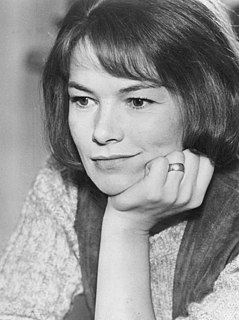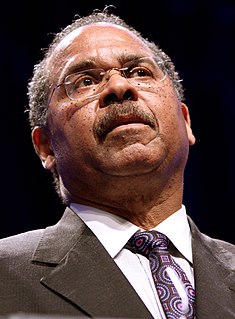A Quote by Jerry Brown
The whole Jeffersonian ideal was that people are temporarily in government. Government is not the basic reality. People are. The private sector. And government is just a limited power to make things go better.
Related Quotes
When government does, occasionally, work, it works in an elitist fashion. That is, government is most easily manipulated by people who have money and power already. This is why government benefits usually go to people who don't need benefits from government. Government may make some environmental improvements, but these will be improvements for rich bird-watchers. And no one in government will remember that when poor people go bird-watching they do it at Kentucky Fried Chicken.
Government investment unlocks a huge amount of private sector activity, but the basic research that we put into IT work that led to the Internet and lots of great companies and jobs, the basic work we put into the health care sector, where it's over $30 billion a year in R&D that led the biotech and pharma jobs. And it creates jobs and it creates new technologies that will be productized. But the government has to prime the pump here. The basic ideas, as in those other industries, start with government investment.
Despite its potential, the federal government has restricted funding for creating new cell lines - putting the burden of any future research squarely on the shoulders of the private sector. Government's most basic responsibility, however, is the health and welfare of its people, so it has a duty to encourage appropriate scientific investigations that could possibly save the lives of millions.
When people abuse these freedoms to enrich themselves at the expense of others, then the public will demand the government to step in. That is how government grows, and how freedom is diminished.... When financial meltdowns occur, the public's outrage drives government to take over part of the private sector. When the government does so, it replaces irresponsible executives with unaccountable bureaucrats. That takes us out of the frying pan and into the fire.
I spent my whole life in the private sector, 25 years in the private sector. I understand that when government takes more money out of the hands of people, it makes it more difficult for them to buy things. If they can't buy things, the economy doesn't grow. If the economy doesn't grow, we don't put Americans to work.
The Senate, compared to the House, is where things are supposed to slow down, by design, Founding Father design. The Founding Fathers were hell-bent to stop government action. The Constitution limited government. And that's why people like Obama and Democrats call it a charter of negative liberties because it limits government. It's an anti-government, pro-citizen document. And the founders wanted to make it hard.
The real problem is that "limited government" invariably leads to unlimited government. If history is to be any guide and current experience is to be any guide, we in the United States 200 years ago started out with the notion of limited government - virtually no government interference - and we now have a massive quasi-totalitarian government.
Year after year in Washington, budget debates seem to come down to an old, tired argument: on one side, those who want more government, regardless of the cost; on the other, those who want less government, regardless of the need....Government has a role, and an important role. Yet, too much government crowds out initiative and hard work, private charity and the private economy....Government should be active, but limited; engaged, but not overbearing.































